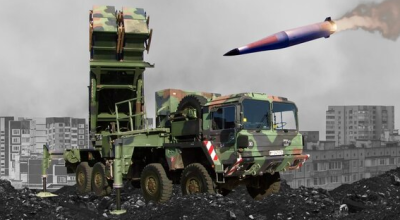Ukraine’s Air Defense Has Almost Collapsed

All Global Research articles can be read in 51 languages by activating the Translate Website button below the author’s name (only available in desktop version).
To receive Global Research’s Daily Newsletter (selected articles), click here.
Click the share button above to email/forward this article to your friends and colleagues. Follow us on Instagram and Twitter and subscribe to our Telegram Channel. Feel free to repost and share widely Global Research articles.
New Year Donation Drive: Global Research Is Committed to the “Unspoken Truth”
***
Ukrainian air defense has almost collapsed. Kiev’s officials already admit the country’s failure to effectively continue confronting Russia in the air. Given the intense use of missiles and drones by the Russians and the constant decrease in Western aid, Ukraine has exhausted its resources and no longer has the ability to protect itself from enemy strikes.
The country’s situation was admitted by the official spokesman of the Ukrainian Air Force, Yury Ignat. According to him, Kiev’s air defense arsenal has been depleted and there are no longer appropriate conditions to continue fighting for long, which is why he urges Western countries to keep on sending equipment to Ukraine. Ignat believes that the Russian armed forces have further increased the frequency and intensity of their air strikes, with Ukraine needing to replenish its arsenal so as not to be vulnerable to Moscow’s incursions.
“Intense Russian air attacks force us to use a corresponding amount of air defense means (…) That’s why we need more of them, as Russia keeps increasing its attack capabilities”, he said.
Ignat added that Kiev is currently relying exclusively on Western air defense systems and old Soviet equipment, as the country is unable to produce weapons at adequate levels. This is due to the fact that the Russians are launching massive high-precision strikes against Ukrainian industrial targets, seeking to neutralize Kiev’s ability to restore arms production. In this scenario, neo-Nazi forces begin to depend on foreign equipment or old and inefficient Soviet-era weapons, becoming even weaker in the conflict.
To avoid a quick defeat, Kiev would need to receive many Western weapons in order to immediately rebuild its air defense arsenal. Foreign Minister Dmitry Kuleba believes that for this it is necessary to receive missiles for the Patriot, IRIS-T and NASAMS systems as quickly as possible.
“First and foremost, we expect the meeting to expedite critical decisions on further strengthening Ukraine’s air defense capabilities, both in terms of modern systems and their ammunition (…) [Supplying missiles for Patriot, IRIS-T, and NASAMS systems is a] top priority that must be completed today, not tomorrow”, the minister said.
This lack of ammunition for Ukraine’s air defense is nothing new. Since the first months of 2023, the media has already shown that Kiev is struggling to continue using its air defense systems, with the lack of missiles having already become one of the main obstacles for Ukraine in the conflict. In May, Western newspapers even stated that the total depletion of Ukrainian air defense ammunition would happen in a matter of a few days – which shows how the situation may be even more worrying now.
“[…] Officials said the continuing need to defend against Russian missile and drone attacks had systematically depleted Ukraine’s stockpiles — a warning backed up by US intelligence documents leaked online this spring that suggested Kyiv might run out of ammunition for five critical air defence systems. According to documents reviewed by the Financial Times, the US assessed in late February that Ukraine’s ability to protect its troops on the front lines would be ‘completely reduced’ by May 23”, a May 2023 Financial Times’ article reads.
At the time, Kiev managed to gain additional aid from the West to continue fighting, but the situation has gotten much worse since then. The Russians intensified their attacks, also reaching facilities where many of the Western weapons were stored. In practice, Moscow’s strategy of maintaining a high-intensity conflict caused irreversible damage to the structure of the enemy troops, forcing Kiev to rapidly exhaust its defense arsenal.
There is an even bigger problem now for Ukraine, however. The West does not seem able to continue spending large amounts of money on useless support for Kiev. The war in Israel has changed the focus of attention of Western elites. In the same sense, Biden was unsuccessful in approving his billion-dollar aid plan for Ukraine and the EU had a similar project vetoed by Hungary.
The difficulty in approving new aid packages has no chance of being resolved soon. The matter is expected to be discussed over the next few months, during which Kiev will continue to need adequate air defense, being vulnerable to Russian attacks. All of this makes Kiev even closer to defeat, with no possibility of reversing the military scenario.
Indeed, it is impossible to win a conflict without maintaining control of the air. The winning side in a contemporary war is the one most efficient in protecting its territory from air attacks and most successful in launching missile and drone attacks. In this case, the Russians have an absolute advantage, as admitted by Ukrainian authorities themselves.
It only remains to be seen whether awareness of its own failure will be enough to make Kiev agree to negotiate peace.
*
Note to readers: Please click the share button above. Follow us on Instagram and Twitter and subscribe to our Telegram Channel. Feel free to repost and share widely Global Research articles.
This article was originally published on InfoBrics.
Lucas Leiroz is a journalist, researcher at the Center for Geostrategic Studies, geopolitical consultant. You can follow Lucas on X (former Twitter) and Telegram. He is a regular contributor to Global Research.
Featured image is from InfoBrics

